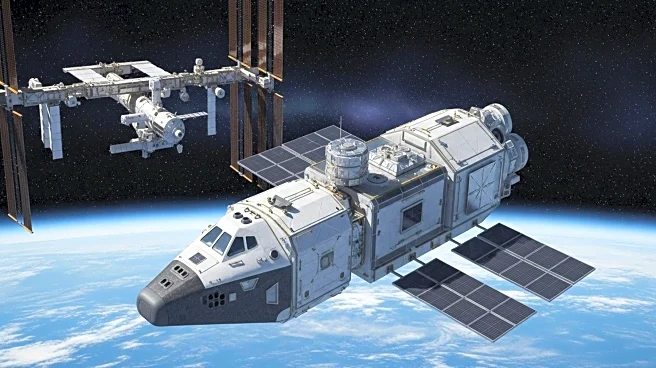What's Happening?
The Progress 93 cargo craft, operated by Roscosmos, is scheduled to dock with the International Space Station (ISS) on September 11, 2025. The spacecraft launched from the Baikonur Cosmodrome in Kazakhstan atop a Soyuz rocket at 11:54 a.m. EDT. It is expected to automatically dock at the aft port of the ISS's Zvezda module at approximately 1:27 p.m. EDT. This mission is part of ongoing efforts to supply the ISS with necessary equipment and materials for research and operations. NASA is providing live coverage of the docking process through various platforms, including NASA+, Amazon Prime, and social media channels.
Why It's Important?
The docking of Progress 93 is crucial for maintaining the continuous operation and research activities aboard the ISS. The cargo craft delivers essential supplies, scientific equipment, and other materials that support the astronauts and their experiments. This mission underscores the collaborative efforts between NASA and Roscosmos, highlighting international cooperation in space exploration. The successful docking and delivery of supplies ensure that the ISS can continue its role as a hub for scientific research and international collaboration, contributing to advancements in space technology and knowledge.
What's Next?
Following the docking, the crew aboard the ISS will begin unloading the cargo and integrating the new supplies into their daily operations. The materials delivered will support ongoing experiments and potentially initiate new research projects. The successful docking also sets the stage for future missions, as NASA and Roscosmos continue to collaborate on space exploration initiatives. The ISS will remain a focal point for international scientific research, with upcoming missions planned to further expand its capabilities and contributions to space science.
Beyond the Headlines
The Progress 93 mission highlights the importance of international partnerships in advancing space exploration. The collaboration between NASA and Roscosmos exemplifies how countries can work together to achieve common goals in science and technology. This mission also reflects the growing reliance on automated systems in space operations, as the Progress 93 cargo craft is unpiloted and relies on automated docking technology. Such advancements may pave the way for more efficient and cost-effective space missions in the future.









